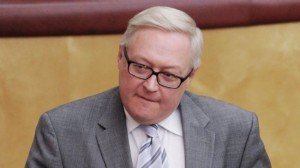 VIENNA, October 16 (RIA Novosti) � Every time a deadline for signing a comprehensive agreement on Iran's nuclear program is extended, the risk of the talks failure increases, Russian Deputy Foreign Minister Sergei Ryabkov told RIA Novosti.
VIENNA, October 16 (RIA Novosti) � Every time a deadline for signing a comprehensive agreement on Iran's nuclear program is extended, the risk of the talks failure increases, Russian Deputy Foreign Minister Sergei Ryabkov told RIA Novosti."Obviously, every new extension, if there are discussions about it at this stage, will be more difficult than the previous one, and the risk of total failure also increases," Ryabkov said Wednesday. "The talks have been extended before, and settling on the conditions of such an extension was very difficult," he added.
"But we all are doing our best for the agreement to be worked out by this deadline [November 24]," Ryabkov said.
Russian Deputy Foreign Minister noted, however, that funding a sustainable agreement to the Iranian nuclear issue is by far more important than meeting a deadline.
"Achieving a sustainable result that would be resistant to international developments is more important than�meeting�a certain deadline. Though there is no doubt that having a deadline gives a stimulus," Ryabkov said, reiterating that "the result is more important than a deadline."
The last steps to reach a comprehensive agreement on Iran's nuclear program are the hardest ones, and now it is political will which will determine the talks' outcome, Sergei Ryabkov said upon arrival, citing Iranian negotiators.
"Our Iranian colleagues have very justly assessed the troubles of the current situation, as they said that a long way has been made, but the last steps are the hardest to make," Ryabkov stated on Wednesday.
"We have always said that political will matters most for achieving the agreement. If it is there or not, we are yet to find out," he said, adding that it would not take long.
According to Ryabkov, the issue of sanctions, the volume of enrichment activities and Iran's Arak nuclear reactor remain among the key issues on the agenda of talks between Tehran and the so-called P5+1 group of international mediators, which includes Russia, China, the United States, the United Kingdom, France and Germany.
However, according to the Russian Deputy Foreign Minister no 'earthquakes or avalanches' are expected at the talks, even though some technical "unpredictabilities" are possible.
"We are ready to unpredictabilities," Ryabkov said. "But they will be mostly of tactical and technical nature, rather than the change of the entire landscape. There will be no earthquakes or avalanches," Ryabkov noted.
The West has accused Tehran of developing nuclear weapons under the guise of a civilian nuclear program � claims, repeatedly denied by the Iranian authorities. At a meeting, held in November 2013 in Geneva, Iran and the P5+1 group agreed to reach a long-term nuclear agreement by July 2014. The deadline was later postponed to November 24, 2014.
The previous round of negotiations between Iran and the international mediators took place in September in New York, but did not yield any results as the parties failed to agree on any of the key issues. The next meeting is to be held in Vienna later on Thursday.
By RIA Novosti
The Iran Project is not responsible for the content of quoted articles.










